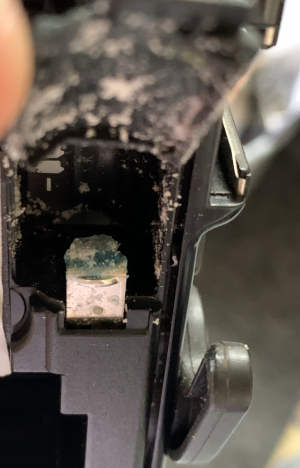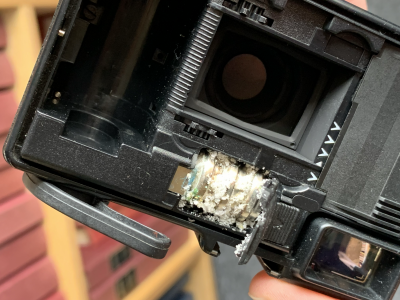justjasper
Member
Just taken delivery of an Agfa Optima Sensor 1535; all seemed to be in decent nick from the listing pictures, but then I opened the battery compartment and was confronted with an absolute mess of exploded, corroded batteries.
Anyone have any insight as to whether this might be salvageable, or whether I should just go straight back to the seller and return it?
Many thanks for any input!
Anyone have any insight as to whether this might be salvageable, or whether I should just go straight back to the seller and return it?
Many thanks for any input!
Attachments
KoNickon
Nick Merritt
I am not familiar with this camera, so I don't know how desirable or rare it is. It looks like you've removed the batteries, and the battery department doesn't appear horrible -- could be cleaned up with vinegar and other things (I'm sure folks will suggest their favorite cleaning agents). I would advise not opening the camera up further, though. The seller may well take the reasonable position that your doing more than cleaning the compartment and installing new battery/ies would basically void any obligation he has to give you a refund.
So try and see if you can clean it successfully -- fingers crossed that doing that, and installing new batteries, is all that's necessary. But I wouldn't do any further repair efforts at this point.
But I would send these pictures to the seller without delay -- "Here's what I saw when I opened it up" -- and indicate that if you cannot get it working by cleaning and installing new batteries, you will send it back and expect a refund.
So try and see if you can clean it successfully -- fingers crossed that doing that, and installing new batteries, is all that's necessary. But I wouldn't do any further repair efforts at this point.
But I would send these pictures to the seller without delay -- "Here's what I saw when I opened it up" -- and indicate that if you cannot get it working by cleaning and installing new batteries, you will send it back and expect a refund.
justjasper
Member
Thanks Nick! Your thoughts much appreciated. I've already contacted the seller as you suggest, and the response came quickly that if I can't get it working by cleaning the contacts and inserting new batteries, I'll be able to get a refund.
Is vinegar the best bet, or would something like isopropyl alcohol also work?
Is vinegar the best bet, or would something like isopropyl alcohol also work?
KoNickon
Nick Merritt
Vinegar should remove the corrosion.* I'd use the isopropyl once you've used the vinegar, to thoroughly clean the residual vinegar. And to go even further, use something like a pencil eraser to remove further oxidation from the contacts -- brighten them up as it were.
*As I noted before, other folks may have more specific suggestions about application of the vinegar, or have alternative suggestions.
*As I noted before, other folks may have more specific suggestions about application of the vinegar, or have alternative suggestions.
Out to Lunch
Menteur
YouTube has half a dozen clips on leaking battery clean-up operations. Cheers, OtL
justjasper
Member
Thanks both! Will have a look on YouTube too.
Coldkennels
Barnack-toting Brit.
Last time I cleaned up a flash with severe corrosion in the battery compartment, I went for a three-step process:
1) vinegar to neutralise the alkali
2) WD-40 to remove any oxidisation/corrosion
3) isopropyl to remove the WD-40 and leave it clean.
Touch wood, that seems to have worked. Skipping the WD-40 step just resulted in the corrosion coming back within a month or two, but adding it in to the process seems to have done the trick.
Note that I could remove all the contacts from the rest of the unit completely. I wouldn't go spraying WD-40 near ANYTHING without you remove the contacts and isolate them first. WD-40 is an utter nightmare and knackers more things than it fixes.
1) vinegar to neutralise the alkali
2) WD-40 to remove any oxidisation/corrosion
3) isopropyl to remove the WD-40 and leave it clean.
Touch wood, that seems to have worked. Skipping the WD-40 step just resulted in the corrosion coming back within a month or two, but adding it in to the process seems to have done the trick.
Note that I could remove all the contacts from the rest of the unit completely. I wouldn't go spraying WD-40 near ANYTHING without you remove the contacts and isolate them first. WD-40 is an utter nightmare and knackers more things than it fixes.
justjasper
Member
Just to give a final update on this: I cleaned up the corrosion very thoroughly and the contacts looked clean, but no signs of life. So the camera’s been returned and a full refund is pending. Fingers crossed I’ll come across a working example at some point.
Thanks again to everyone that weighed in.
Thanks again to everyone that weighed in.
DownUnder
Nikon Nomad
Last time I cleaned up a flash with severe corrosion in the battery compartment, I went for a three-step process:
1) vinegar to neutralise the alkali
2) WD-40 to remove any oxidisation/corrosion
3) isopropyl to remove the WD-40 and leave it clean.
Touch wood, that seems to have worked. Skipping the WD-40 step just resulted in the corrosion coming back within a month or two, but adding it in to the process seems to have done the trick.
Note that I could remove all the contacts from the rest of the unit completely. I wouldn't go spraying WD-40 near ANYTHING without you remove the contacts and isolate them first. WD-40 is an utter nightmare and knackers more things than it fixes.
Heaps of good advice in this thread, but then we expect this from RFf, it's that sort of place.
I had this same problem with the same camera, some years ago. Cleaned it up nicely, fortunately mine worked after all my 'internal restoration' was done and new batteries were put in. Too bad yours stayed 'deceased', the Optimas are beaut cameras. Incredibly sharp lenses and easy to use. A mini-Plaubel Makina...
I used isopropyl alcohol. My camera repair man long ago advised to steer clear of WD-40 for internal camera work, as it tends to soak into other areas and it can easily damage the 'lektricals'. If you must, use it sparingly.
Likely vinegar would do the trick. Again, the important point is to use it sparingly. A little soaked into a cotton bud will probably suffice. A few cotton buds with vinegar may be needed, but those are dirty-cheap anyway.
Good thing to also remember for all of us. Remove batteries from all cameras when not in use!!
Coldkennels
Barnack-toting Brit.
Agreed 100%.My camera repair man long ago advised to steer clear of WD-40 for internal camera work, as it tends to soak into other areas and it can easily damage the 'lektricals'. If you must, use it sparingly.
WD-40 is, like I said, an utter nightmare. It's not a lubricant, despite what people think. It migrates like crazy, and it tends to leave a film on things. It has a very, very limited use-case scenario in reality, but people tend to spray it everywhere and on everything and then wonder why it's all gone bad. I saw a video of a camera tech down in Australia testing the shutter in a guy's M6 and she said she outright refuses to work on any camera that's had WD-40 anywhere near it. Too many people have ruined cameras that way.
The only time I've ever sprayed it on anything that was even remotely still intact was when I was fixing up a long-base FOFER rangefinder a few months back and found the adjustment screws were rusted and seized solid (and over-tightened thanks to some idiot who'd owned it previously). Lighter fluid hadn't helped, so it was very much a last-ditch option - and as I was already strip-cleaning it, there was no real risk.
JoeV
Thin Air, Bright Sun
WD40 = Water Displacing Formula 40.
KoNickon
Nick Merritt
The more I hear about WD40 the less I know just what it's good for. Maybe for items exposed to water, like door locks? But for cameras (and typewriters too) -- avoid entirely.
For rusted/oxidized/stuck threads, a drop or two of penetrating oil (like Liquid Wrench or 3-in-1 Oil here in the US) work really well, especially given time to work (overnight, say).
For rusted/oxidized/stuck threads, a drop or two of penetrating oil (like Liquid Wrench or 3-in-1 Oil here in the US) work really well, especially given time to work (overnight, say).
Dralowid
Michael
WD40 is excellent for spraying on wet or damp spark plug leads and other electrical components. It is not a particularly good penetrating fluid. It is a temporary lubricant for things that are gummed up but it is designed to creep which is exactly what you don't want it to do in a camera.
bcostin
Well-known
Oftentimes when the battery compartment and contacts are corroded, the corrosion has also crept up the wires connected to the terminals. If you're lucky you can clean things up and replace the wires. If unlucky, the corrosion has also spread to the circuit board and caused other damage which is sometimes practical to fix, sometimes not.
Share:
-
This site uses cookies to help personalise content, tailor your experience and to keep you logged in if you register.
By continuing to use this site, you are consenting to our use of cookies.



